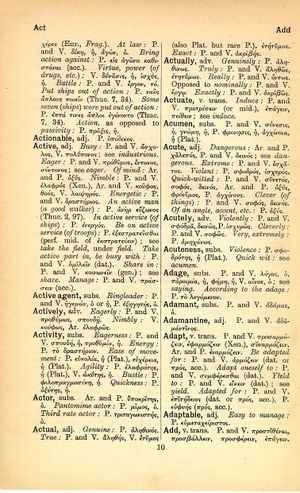acute
From LSJ
Κρεῖττον τὸ μὴ ζῆν ἐστιν ἢ ζῆν ἀθλίως → Death is better than a life of misery → Satius mori quam calamitose vivere → Der Tod ist besser als ein Leben in der Not
English > Greek (Woodhouse)
adj.
Dangerous: Ar. and P. χαλεπός, P. and V. δεινός; see dangerous.
Extreme: P. and V. ἔσχατος.
Quick-witted: P. and V. συνετός, σοφός, δεινός, Ar. and P. ὀξύς, φρόνιμος, P. ἀγχίνους.
Clever (of things): P. and V. σοφός, δεινός.
Of an angle, accent, etc. P. ὀξύς.
Latin > English (Lewis & Short)
ăcūte: adv., v. acuo,
I P. a. fin.
Latin > French (Gaffiot 2016)
ăcūtē¹² (acutus), de façon aiguë, perçante, fine, pénétrante : [avec l’idée de penser] Cic. Off. 1, 56 ; [de raisonner, disserter] Cic. Fin. 3, 2 ; Tusc. 5, 28 ; [de parler, d’écrire] Cic. Br. 108 ; Læl. 6 ; Verr. 2, 2, 20, etc.

